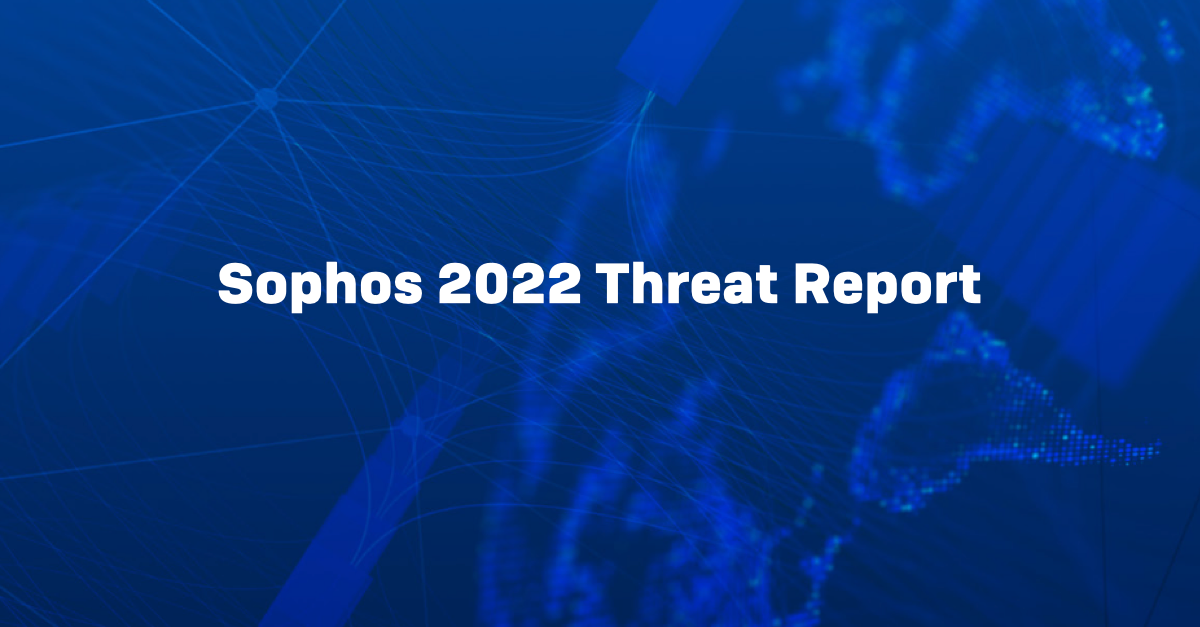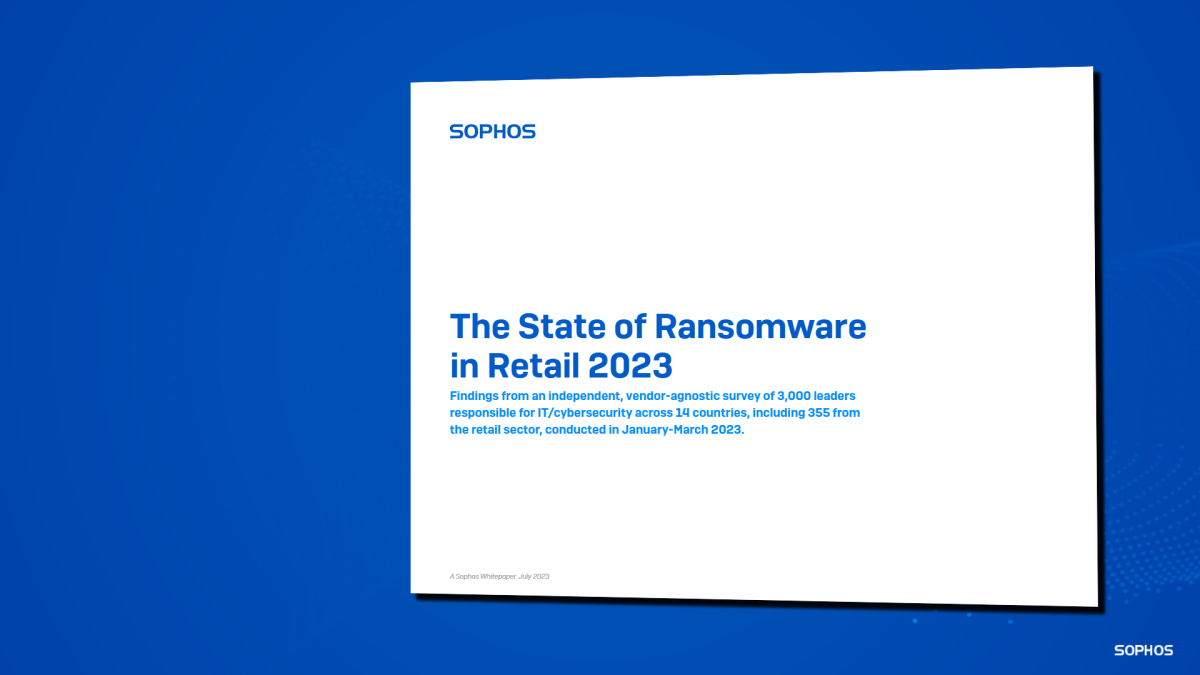TechNews
Sophos publishes 2022 Threat Report: What we learned about Ransomware
….In-depth Report Identifies Trends in Ransomware Services, Commodity Malware, Attack Tools, Cryptominers, and More That Are Impacting IT Security, reports SANDRA ANI


Sophos, a global leader in next-generation cybersecurity, today published the Sophos 2022 Threat Report, which shows how the gravitational force of ransomware’s black hole is pulling in other cyberthreats to form one massive, interconnected ransomware delivery system – with significant implications for IT security.
The report, written by SophosLabs security researchers, Sophos Managed Threat Response threat hunters and rapid responders, and the Sophos AI team, provides a unique multi-dimensional perspective on security threats and trends facing organizations in 2022.
The Sophos 2022 Threat Report analyzes the following key trends:
1. Over the coming year, the ransomware landscape will become both more modular and more uniform, with attack “specialists” offering different elements of an attack “as-a-service” and providing playbooks with tools and techniques that enable different adversary groups to implement very similar attacks.
According to Sophos researchers, attacks by single ransomware groups gave way to more ransomware-as-a-service (RaaS) offerings during 2021, with specialist ransomware developers focused on hiring out malicious code and infrastructure to third-party affiliates.
Some of the most high profile ransomware attacks of the year involved RaaS, including an attack against Colonial Pipeline in the U.S. by a DarkSide affiliate.
An affiliate of Conti ransomware leaked the implementation guide provided by the operators, revealing the step-by-step tools and techniques that attackers could use to deploy the ransomware.
Once they have the malware they need, RaaS affiliates and other ransomware operators can turn to Initial Access Brokers and malware delivery platforms to find and target potential victims. This is fueling the second big trend anticipated by Sophos.
2. Established cyberthreats will continue to adapt to distribute and deliver ransomware. These include loaders, droppers and other commodity malware; increasingly advanced, human-operated Initial Access Brokers; spam; and adware. In 2021, Sophos reported on Gootloader operating novel hybrid attacks that combined mass campaigns with careful filtering to pinpoint targets for specific malware bundles.
3. The use of multiple forms of extortion by ransomware attackers to pressure victims into paying the ransom is expected to continue and increase in range and intensity.
In 2021, Sophos incident responders catalogued 10 different types of pressure tactics, from data theft and exposure, to threatening phone calls, distributed denial of service (DDoS) attacks, and more.
4. Cryptocurrency will continue to fuel cybercrimes such as ransomware and malicious cryptomining, and Sophos expects the trend will continue until global cryptocurrencies are better regulated.
During 2021, Sophos researchers uncovered cryptominers such as Lemon Duck and the less common, MrbMiner, taking advantage of the access provided by newly reported vulnerabilities and targets already breached by ransomware operators to install cryptominers on computers and servers.


Chester Wisniewski, principal research scientist at Sophos
“Ransomware thrives because of its ability to adapt and innovate,” said Chester Wisniewski, principal research scientist at Sophos. “For instance, while RaaS offerings are not new, in previous years their main contribution was to bring ransomware within the reach of lower-skilled or less well-funded attackers. This has changed and, in 2021, RaaS developers are investing their time and energy in creating sophisticated code and determining how best to extract the largest payments from victims, insurance companies, and negotiators. They’re now offloading to others the tasks of finding victims, installing and executing the malware, and laundering the pilfered cryptocurrencies. This is distorting the cyberthreat landscape, and common threats, such as loaders, droppers, and Initial Access Brokers that were around and causing disruption well before the ascendancy of ransomware, are being sucked into the seemingly all-consuming ‘black hole’ that is ransomware.
“It is no longer enough for organizations to assume they’re safe by simply monitoring security tools and ensuring they are detecting malicious code. Certain combinations of detections or even warnings are the modern equivalent of a burglar breaking a flower vase while climbing in through the back window. Defenders must investigate alerts, even ones which in the past may have been insignificant, as these common intrusions have blossomed into the foothold necessary to take control of entire networks.”
Additional trends Sophos analyzed include:
- After the ProxyLogon and ProxyShell vulnerabilities were discovered (and patched) in 2021, the speed at which they were seized upon by attackers was such that Sophos expects to see continued attempts to mass-abuse IT administration tools and exploitable internet facing services by both sophisticated attackers and run-of-the-mill cybercriminals
- Sophos also expects cybercriminals to increase their abuse of adversary simulation tools, such as Cobalt Strike Beacons, mimikatz and PowerSploit. Defenders should check every alert relating to abused legitimate tools or combination of tools, just as they would check a malicious detection, as it could indicate the presence of an intruder in the network
- In 2021, Sophos researchers detailed a number of new threats targeting Linux systems and expect to see a growing interest in Linux-based systems during 2022, both in the cloud and on web and virtual servers
- Mobile threats and social engineering scams, including Flubot and Joker, are expected to continue and diversify to target both individuals and organizations
- The application of artificial intelligence to cybersecurity will continue and accelerate, as powerful machine learning models prove their worth in threat detection and alert prioritization. At the same time, however, adversaries are expected to make increasing use of AI, progressing over the next few years from AI-enabled disinformation campaigns and spoof social media profiles to watering-hole attack web content, phishing emails and more as advanced deepfake video and voice synthesis technologies become available
To learn more about the threat landscape in 2021 and what this means for IT security in 2022, read the full Sophos 2022 Threat Report.
TechNews
inq.Digital Supports Payments Forum Nigeria [PAFON 1.0]


Inq. Digital Nigeria Limited has been announced as a sponsor of Payments Forum Nigeria [PAFON 1.0] maiden edition holding this Thursday in Lagos.
inq. Digital Nigeria Limited, a subsidiary of inq. Group is an emerging leading digital and cloud solutions provider that delivers simpler seamless solutions to complex business challenges.
With offices in Lagos, Abuja, Port Harcourt and Kano, inq. provides reliable and affordable Intelligent Connectivity, SDN/NFV, Cloud and Digital services (including Edge –AI) for Nigerian businesses including those in the payment space.
Participation is FREE, however, pre-registration is required: https://bit.ly/4c4N19H.
Speaking ahead of Payments Forum Nigeria [PAFON 1,0] scheduled to take place at Oriental Hotel, Lekki Road, Lagos on Thursday, March 21, 2024 by 9am under the theme: “Payments: Trust, Security and Privacy in AI Era”, Mr. Chike Onwuegbuchi, the co-founder of TechCastle Foundation, the organisers, said the goal is to enable information exchange and knowledge sharing on key industry insights issues amongst key stakeholders, with the objective of ensuring a collaborative and proactive approach to push for policies that enable growth, tackling/mitigating fraud and limiting occurrences and losses.
Speakers
The following speakers are lined up for the Forum: Chibuzo Efobi, Director, Payments System Management, Central Bank of Nigeria (CBN); Festus Amede, Chairman, Committee of Chief Information Security Officers of Nigerian Financial institutions (CCISONFI; Dr. Adewale Peter Obadare, Chief Visionary Officer (CVO), Digital Encode Limited; Adetokunbo Omotosho, Chief Executive Officer, Cybervergent; Roosevelt Elias, Founder, Payble; Ikenna Ndugbu, chief compliance officer, Moniepoint MFB, and Peter Evbota, Sales Director at inq. Digital Nigeria Limited.
Payments Forum Nigeria is organised by TechCastle Foundation and sponsored by: inq. Digital Nigeria Limited, Cybervergent, Moniepoint, Digital Encode Limited, Payble with support from the Central Bank of Nigeria (CBN).
Business
Meet Kingsley Adonu


In the dynamic world of entrepreneurship, there are visionaries who not only navigate the business landscape but redefine it. Meet Kingsley Adonu, the Founder and Chief Executive Officer of the SMobile Group, a conglomerate that stands as a beacon of excellence and diversity in the global business arena.
Kingsley Adonu is a visionary entrepreneur and the Founder of the SMobile Group, a conglomerate synonymous with excellence and diversity. As the Chief Executive Officer, he has steered the group to remarkable heights, overseeing a spectrum of businesses that span across Telecommunications, Oil and Gas, Real Estate, Hospitality, Water Production, Agriculture, Technology, E-commerce, Energy, Sports, Entertainment, Education, Health, Logistics and Financial Services, with branches extending globally to UK, USA, China, South Africa, and Canada.
Under Kingsley’s astute leadership, SMobile Group has emerged as a major partner for MTN, evident in the impactful presence of the SMobile brand in the telecommunications landscape. His strategic insights and forward-thinking approach have positioned the group as a dynamic player in multiple industries.
Beyond the boardroom, Kingsley Adonu is a dedicated philanthropist, committed to making a positive impact in communities. His philanthropic efforts extend beyond business, reflecting a deep-seated belief in the responsibility of successful individuals to contribute meaningfully to society.
Kingsley’s influence is not confined to national borders; he has actively participated in numerous international telecom conferences, further enriching his understanding of global industry trends and fostering valuable connections with industry leaders worldwide.
With an unwavering commitment to excellence, Kingsley Adonu continues to inspire and lead the SMobile Group towards new horizons, blending business acumen with a passion for positive societal change.
TechNews
Only 26% of Surveyed Organizations Stopped Data Encryption by Cybercriminals – Sophos
Retail organizations attacked by ransomware increasingly unable to halt an attack in progress, Sophos Survey Finds, writes SANDRA ANI


- This Is the Lowest Rate of Disruption in 3 Years
Sophos, a global leader in innovating and delivering cybersecurity as a service, today shared findings from its sector survey report, “The State of Ransomware in Retail 2023,” which found that only 26% of retail organizations this past year were able to disrupt a ransomware attack before their data was encrypted.
Sophos, a global leader in innovating and delivering cybersecurity as a service, today shared findings from its sector survey report, “The State of Ransomware in Retail 2023,” which found that only 26% of retail organizations this past year were able to disrupt a ransomware attack before their data was encrypted.
This is a three-year low for the sector—a decline from 34% in 2021 and 28% in 2022—suggesting the sector is increasingly unable to halt ransomware attacks already in progress.
“Retailers are losing ground in the battle against ransomware. Ransomware criminals have been encrypting increasingly greater percentages of their retail victims in the last three years, as evidenced by the steadily declining rate of retailers stopping cybercriminal attacks in progress. Retailers must up their defensive game by setting up security that detects and responds to intrusions earlier in the attack chain,” said Chester Wisniewski, director, global field CTO, Sophos.
In addition, the report found that, for those retail organizations that paid the ransom, their median recovery costs (not including the ransom payment) were four times the recovery costs of those that used backups to recover their data ($3,000,000 versus $750,000).
“Forty-three percent of retail victims paid the ransom according to our survey respondents, yet the median recovery cost to victims who paid the ransom was four times the cost to those who used backups and other recovery methods. There are no shortcuts in these situations and rebuilding systems is almost always required. It’s better to deprive the criminals of their spoils and build back better,” said Wisniewski.
Additional key findings from the report include:
- In line with a broader, cross-sector trend, the retail sector experienced its highest rate of encryption over the past three years, with 71% of those organizations targeted by ransomware stating that attackers successfully encrypted their data
- The percentage of retail organizations attacked by ransomware declined from 77% last year to 69% this year
- The percentage of retail organizations that recovered in less than a day decreased from 15% to 9% this year, while the percentage of retail organizations that took more than a month to recover increased from 17% to 21%
Sophos recommends the following best practices to help defend against ransomware and other cyberattacks:
- Strengthen defensive shields with:
- Security tools that defend against the most common attack vectors, including endpoint protection with strong anti-ransomware and anti-exploit capabilities
- Zero Trust Network Access (ZTNA) to thwart the abuse of compromised credentials
- Adaptive technologies that respond automatically to attacks, disrupting adversaries and buying defenders time to respond
- 24/7 threat detection, investigation and response, whether delivered in-house or by a specialized Managed Detection and Response (MDR) provider
- Optimize attack preparation, including regularly backing up, practicing recovering data from backups and maintaining an up-to-date incident response plan
- Maintain security hygiene, including timely patching and regularly reviewing security tool configurations
To learn more about the State of Ransomware in Retail 2023, download the full report from Sophos.com.
The State of Ransomware 2023 survey polled 3,000 IT/cybersecurity leaders in organizations with between 100 and 5,000 employees, including 355 from the retail sector, across 14 countries in the Americas, EMEA and Asia Pacific.
-



 Transport4 days ago
Transport4 days agoFederal Government To Launch Out 2700 CNG Buses, Tricycles Ahead Of First anniversary Of Tinubu’s Administration
-



 News4 days ago
News4 days agoNigeria Has Secured $2.25B World Bank Loan With An Interest Rate Of 1% – Minister Of Finance
-



 Tech1 day ago
Tech1 day agoAnambra School Emerges Winner In National Girls In ICT Competition With Groundbreaking VR Technology
-



 News1 day ago
News1 day agoNiger State Prisoners Run From Facility After Rainstorm Brings Down Part Of Fencing
-



 Spotlight1 day ago
Spotlight1 day agoNigerian Woman Breaks Guinness World Record With 55-Hour Interview Marathon
-



 Finance3 days ago
Finance3 days agoGodwin Emefiele Disobeyed Direction Of Law With Intent To Harm The Public, He Printed ₦684.5M Using ₦18.9B Says EFCC in fresh charge
-



 Politics23 hours ago
Politics23 hours agoEnugu State Government Flag Off Palliative Distribution In The State
-



 News3 days ago
News3 days agoEFCC: Former Governor Of Kogi State, Yahaya Bello Fails To Show Up In Court, Says He Is Scared Of Arrest






